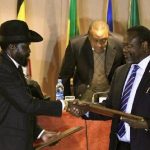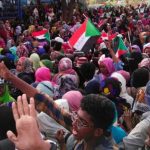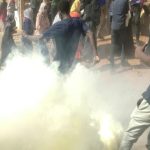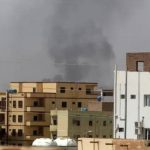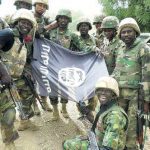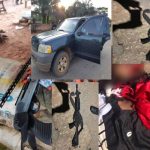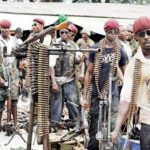Sudan’s army launched artillery and air strikes in Khartoum on Thursday, the largest offensive to retake terrain since the beginning of its 17-month conflict with the Rapid Support Forces (RSF), witnesses and military officials said.
The army’s advance came ahead of its leader, Gen Abdel Fattah al-Burhan, speaking later that day at the UN General Assembly in New York.
Witnesses reported heavy bombardments and clashes as army troops tried to cross bridges across the Nile connecting the three adjoining cities that make up the greater capital: Khartoum, Omdurman and Bahri.
According to army sources, soldiers crossed bridges in Khartoum and Bahri.
The RSF informed journalsts that it had blocked the army’s effort to cross two bridges to Khartoum.
Though the army retook some area in Omdurman earlier this year, it is mostly relying on artillery and airstrikes and has been unable to dislodge agile RSF ground units entrenched throughout the capital.
In recent months, the RSF has also made progress in other parts of Sudan in a battle that has resulted in a massive humanitarian disaster, displacing over 10 million people and driving parts of the country to extreme hunger or famine.
Diplomatic efforts by the US and other states have failed, with the army declining to attend talks in Switzerland last month.
This month, the war for control of al-Fashir, the capital of North Darfur state in western Sudan, has increased as the RSF attempted to push from positions encircling the city against the army and allied former rebel groups.
Al-Fashir is the final army stronghold in Darfur, where the UN and rights groups claim the RSF and its allies have launched ethnically targeted attacks and the humanitarian situation is dire. The RSF has denied being responsible for the violence.
The UN human rights office said on Thursday it had documented summary executions, sexual and gender-based violence, and abductions of women and young men in al-Fashir, in addition to rising civilian casualties.
The United Nations Security Council and secretary-general have also called for an end to the siege of al-Fashir, which is home to over 1.8 million citizens and displaced refugees.
The war began when tensions between the RSF and the army, which had been jockey for position ahead of an internationally supported transition to civilian administration, flared up into open violence.
The army and RSF previously shared power following a coup in 2021, two years after longtime tyrant Omar al-Bashir was deposed in a popular uprising.
Sudan’s army launched artillery and air strikes in Khartoum on Thursday, the largest offensive to retake terrain since the beginning of its 17-month conflict with the Rapid Support Forces (RSF), witnesses and military officials said.
The army’s advance came ahead of its leader, Gen Abdel Fattah al-Burhan, speaking later that day at the UN General Assembly in New York.
Witnesses reported heavy bombardments and clashes as army troops tried to cross bridges across the Nile connecting the three adjoining cities that make up the greater capital: Khartoum, Omdurman and Bahri.
According to army sources, soldiers crossed bridges in Khartoum and Bahri.
The RSF informed journalsts that it had blocked the army’s effort to cross two bridges to Khartoum.
Though the army retook some area in Omdurman earlier this year, it is mostly relying on artillery and airstrikes and has been unable to dislodge agile RSF ground units entrenched throughout the capital.
In recent months, the RSF has also made progress in other parts of Sudan in a battle that has resulted in a massive humanitarian disaster, displacing over 10 million people and driving parts of the country to extreme hunger or famine.
Diplomatic efforts by the US and other states have failed, with the army declining to attend talks in Switzerland last month.
This month, the war for control of al-Fashir, the capital of North Darfur state in western Sudan, has increased as the RSF attempted to push from positions encircling the city against the army and allied former rebel groups.
Al-Fashir is the final army stronghold in Darfur, where the UN and rights groups claim the RSF and its allies have launched ethnically targeted attacks and the humanitarian situation is dire. The RSF has denied being responsible for the violence.
The UN human rights office said on Thursday it had documented summary executions, sexual and gender-based violence, and abductions of women and young men in al-Fashir, in addition to rising civilian casualties.
The United Nations Security Council and secretary-general have also called for an end to the siege of al-Fashir, which is home to over 1.8 million citizens and displaced refugees.
The war began when tensions between the RSF and the army, which had been jockey for position ahead of an internationally supported transition to civilian administration, flared up into open violence.
The army and RSF previously shared power following a coup in 2021, two years after longtime tyrant Omar al-Bashir was deposed in a popular uprising.
Sudan’s army launched artillery and air strikes in Khartoum on Thursday, the largest offensive to retake terrain since the beginning of its 17-month conflict with the Rapid Support Forces (RSF), witnesses and military officials said.
The army’s advance came ahead of its leader, Gen Abdel Fattah al-Burhan, speaking later that day at the UN General Assembly in New York.
Witnesses reported heavy bombardments and clashes as army troops tried to cross bridges across the Nile connecting the three adjoining cities that make up the greater capital: Khartoum, Omdurman and Bahri.
According to army sources, soldiers crossed bridges in Khartoum and Bahri.
The RSF informed journalsts that it had blocked the army’s effort to cross two bridges to Khartoum.
Though the army retook some area in Omdurman earlier this year, it is mostly relying on artillery and airstrikes and has been unable to dislodge agile RSF ground units entrenched throughout the capital.
In recent months, the RSF has also made progress in other parts of Sudan in a battle that has resulted in a massive humanitarian disaster, displacing over 10 million people and driving parts of the country to extreme hunger or famine.
Diplomatic efforts by the US and other states have failed, with the army declining to attend talks in Switzerland last month.
This month, the war for control of al-Fashir, the capital of North Darfur state in western Sudan, has increased as the RSF attempted to push from positions encircling the city against the army and allied former rebel groups.
Al-Fashir is the final army stronghold in Darfur, where the UN and rights groups claim the RSF and its allies have launched ethnically targeted attacks and the humanitarian situation is dire. The RSF has denied being responsible for the violence.
The UN human rights office said on Thursday it had documented summary executions, sexual and gender-based violence, and abductions of women and young men in al-Fashir, in addition to rising civilian casualties.
The United Nations Security Council and secretary-general have also called for an end to the siege of al-Fashir, which is home to over 1.8 million citizens and displaced refugees.
The war began when tensions between the RSF and the army, which had been jockey for position ahead of an internationally supported transition to civilian administration, flared up into open violence.
The army and RSF previously shared power following a coup in 2021, two years after longtime tyrant Omar al-Bashir was deposed in a popular uprising.
Sudan’s army launched artillery and air strikes in Khartoum on Thursday, the largest offensive to retake terrain since the beginning of its 17-month conflict with the Rapid Support Forces (RSF), witnesses and military officials said.
The army’s advance came ahead of its leader, Gen Abdel Fattah al-Burhan, speaking later that day at the UN General Assembly in New York.
Witnesses reported heavy bombardments and clashes as army troops tried to cross bridges across the Nile connecting the three adjoining cities that make up the greater capital: Khartoum, Omdurman and Bahri.
According to army sources, soldiers crossed bridges in Khartoum and Bahri.
The RSF informed journalsts that it had blocked the army’s effort to cross two bridges to Khartoum.
Though the army retook some area in Omdurman earlier this year, it is mostly relying on artillery and airstrikes and has been unable to dislodge agile RSF ground units entrenched throughout the capital.
In recent months, the RSF has also made progress in other parts of Sudan in a battle that has resulted in a massive humanitarian disaster, displacing over 10 million people and driving parts of the country to extreme hunger or famine.
Diplomatic efforts by the US and other states have failed, with the army declining to attend talks in Switzerland last month.
This month, the war for control of al-Fashir, the capital of North Darfur state in western Sudan, has increased as the RSF attempted to push from positions encircling the city against the army and allied former rebel groups.
Al-Fashir is the final army stronghold in Darfur, where the UN and rights groups claim the RSF and its allies have launched ethnically targeted attacks and the humanitarian situation is dire. The RSF has denied being responsible for the violence.
The UN human rights office said on Thursday it had documented summary executions, sexual and gender-based violence, and abductions of women and young men in al-Fashir, in addition to rising civilian casualties.
The United Nations Security Council and secretary-general have also called for an end to the siege of al-Fashir, which is home to over 1.8 million citizens and displaced refugees.
The war began when tensions between the RSF and the army, which had been jockey for position ahead of an internationally supported transition to civilian administration, flared up into open violence.
The army and RSF previously shared power following a coup in 2021, two years after longtime tyrant Omar al-Bashir was deposed in a popular uprising.
Sudan’s army launched artillery and air strikes in Khartoum on Thursday, the largest offensive to retake terrain since the beginning of its 17-month conflict with the Rapid Support Forces (RSF), witnesses and military officials said.
The army’s advance came ahead of its leader, Gen Abdel Fattah al-Burhan, speaking later that day at the UN General Assembly in New York.
Witnesses reported heavy bombardments and clashes as army troops tried to cross bridges across the Nile connecting the three adjoining cities that make up the greater capital: Khartoum, Omdurman and Bahri.
According to army sources, soldiers crossed bridges in Khartoum and Bahri.
The RSF informed journalsts that it had blocked the army’s effort to cross two bridges to Khartoum.
Though the army retook some area in Omdurman earlier this year, it is mostly relying on artillery and airstrikes and has been unable to dislodge agile RSF ground units entrenched throughout the capital.
In recent months, the RSF has also made progress in other parts of Sudan in a battle that has resulted in a massive humanitarian disaster, displacing over 10 million people and driving parts of the country to extreme hunger or famine.
Diplomatic efforts by the US and other states have failed, with the army declining to attend talks in Switzerland last month.
This month, the war for control of al-Fashir, the capital of North Darfur state in western Sudan, has increased as the RSF attempted to push from positions encircling the city against the army and allied former rebel groups.
Al-Fashir is the final army stronghold in Darfur, where the UN and rights groups claim the RSF and its allies have launched ethnically targeted attacks and the humanitarian situation is dire. The RSF has denied being responsible for the violence.
The UN human rights office said on Thursday it had documented summary executions, sexual and gender-based violence, and abductions of women and young men in al-Fashir, in addition to rising civilian casualties.
The United Nations Security Council and secretary-general have also called for an end to the siege of al-Fashir, which is home to over 1.8 million citizens and displaced refugees.
The war began when tensions between the RSF and the army, which had been jockey for position ahead of an internationally supported transition to civilian administration, flared up into open violence.
The army and RSF previously shared power following a coup in 2021, two years after longtime tyrant Omar al-Bashir was deposed in a popular uprising.
Sudan’s army launched artillery and air strikes in Khartoum on Thursday, the largest offensive to retake terrain since the beginning of its 17-month conflict with the Rapid Support Forces (RSF), witnesses and military officials said.
The army’s advance came ahead of its leader, Gen Abdel Fattah al-Burhan, speaking later that day at the UN General Assembly in New York.
Witnesses reported heavy bombardments and clashes as army troops tried to cross bridges across the Nile connecting the three adjoining cities that make up the greater capital: Khartoum, Omdurman and Bahri.
According to army sources, soldiers crossed bridges in Khartoum and Bahri.
The RSF informed journalsts that it had blocked the army’s effort to cross two bridges to Khartoum.
Though the army retook some area in Omdurman earlier this year, it is mostly relying on artillery and airstrikes and has been unable to dislodge agile RSF ground units entrenched throughout the capital.
In recent months, the RSF has also made progress in other parts of Sudan in a battle that has resulted in a massive humanitarian disaster, displacing over 10 million people and driving parts of the country to extreme hunger or famine.
Diplomatic efforts by the US and other states have failed, with the army declining to attend talks in Switzerland last month.
This month, the war for control of al-Fashir, the capital of North Darfur state in western Sudan, has increased as the RSF attempted to push from positions encircling the city against the army and allied former rebel groups.
Al-Fashir is the final army stronghold in Darfur, where the UN and rights groups claim the RSF and its allies have launched ethnically targeted attacks and the humanitarian situation is dire. The RSF has denied being responsible for the violence.
The UN human rights office said on Thursday it had documented summary executions, sexual and gender-based violence, and abductions of women and young men in al-Fashir, in addition to rising civilian casualties.
The United Nations Security Council and secretary-general have also called for an end to the siege of al-Fashir, which is home to over 1.8 million citizens and displaced refugees.
The war began when tensions between the RSF and the army, which had been jockey for position ahead of an internationally supported transition to civilian administration, flared up into open violence.
The army and RSF previously shared power following a coup in 2021, two years after longtime tyrant Omar al-Bashir was deposed in a popular uprising.
Sudan’s army launched artillery and air strikes in Khartoum on Thursday, the largest offensive to retake terrain since the beginning of its 17-month conflict with the Rapid Support Forces (RSF), witnesses and military officials said.
The army’s advance came ahead of its leader, Gen Abdel Fattah al-Burhan, speaking later that day at the UN General Assembly in New York.
Witnesses reported heavy bombardments and clashes as army troops tried to cross bridges across the Nile connecting the three adjoining cities that make up the greater capital: Khartoum, Omdurman and Bahri.
According to army sources, soldiers crossed bridges in Khartoum and Bahri.
The RSF informed journalsts that it had blocked the army’s effort to cross two bridges to Khartoum.
Though the army retook some area in Omdurman earlier this year, it is mostly relying on artillery and airstrikes and has been unable to dislodge agile RSF ground units entrenched throughout the capital.
In recent months, the RSF has also made progress in other parts of Sudan in a battle that has resulted in a massive humanitarian disaster, displacing over 10 million people and driving parts of the country to extreme hunger or famine.
Diplomatic efforts by the US and other states have failed, with the army declining to attend talks in Switzerland last month.
This month, the war for control of al-Fashir, the capital of North Darfur state in western Sudan, has increased as the RSF attempted to push from positions encircling the city against the army and allied former rebel groups.
Al-Fashir is the final army stronghold in Darfur, where the UN and rights groups claim the RSF and its allies have launched ethnically targeted attacks and the humanitarian situation is dire. The RSF has denied being responsible for the violence.
The UN human rights office said on Thursday it had documented summary executions, sexual and gender-based violence, and abductions of women and young men in al-Fashir, in addition to rising civilian casualties.
The United Nations Security Council and secretary-general have also called for an end to the siege of al-Fashir, which is home to over 1.8 million citizens and displaced refugees.
The war began when tensions between the RSF and the army, which had been jockey for position ahead of an internationally supported transition to civilian administration, flared up into open violence.
The army and RSF previously shared power following a coup in 2021, two years after longtime tyrant Omar al-Bashir was deposed in a popular uprising.
Sudan’s army launched artillery and air strikes in Khartoum on Thursday, the largest offensive to retake terrain since the beginning of its 17-month conflict with the Rapid Support Forces (RSF), witnesses and military officials said.
The army’s advance came ahead of its leader, Gen Abdel Fattah al-Burhan, speaking later that day at the UN General Assembly in New York.
Witnesses reported heavy bombardments and clashes as army troops tried to cross bridges across the Nile connecting the three adjoining cities that make up the greater capital: Khartoum, Omdurman and Bahri.
According to army sources, soldiers crossed bridges in Khartoum and Bahri.
The RSF informed journalsts that it had blocked the army’s effort to cross two bridges to Khartoum.
Though the army retook some area in Omdurman earlier this year, it is mostly relying on artillery and airstrikes and has been unable to dislodge agile RSF ground units entrenched throughout the capital.
In recent months, the RSF has also made progress in other parts of Sudan in a battle that has resulted in a massive humanitarian disaster, displacing over 10 million people and driving parts of the country to extreme hunger or famine.
Diplomatic efforts by the US and other states have failed, with the army declining to attend talks in Switzerland last month.
This month, the war for control of al-Fashir, the capital of North Darfur state in western Sudan, has increased as the RSF attempted to push from positions encircling the city against the army and allied former rebel groups.
Al-Fashir is the final army stronghold in Darfur, where the UN and rights groups claim the RSF and its allies have launched ethnically targeted attacks and the humanitarian situation is dire. The RSF has denied being responsible for the violence.
The UN human rights office said on Thursday it had documented summary executions, sexual and gender-based violence, and abductions of women and young men in al-Fashir, in addition to rising civilian casualties.
The United Nations Security Council and secretary-general have also called for an end to the siege of al-Fashir, which is home to over 1.8 million citizens and displaced refugees.
The war began when tensions between the RSF and the army, which had been jockey for position ahead of an internationally supported transition to civilian administration, flared up into open violence.
The army and RSF previously shared power following a coup in 2021, two years after longtime tyrant Omar al-Bashir was deposed in a popular uprising.



